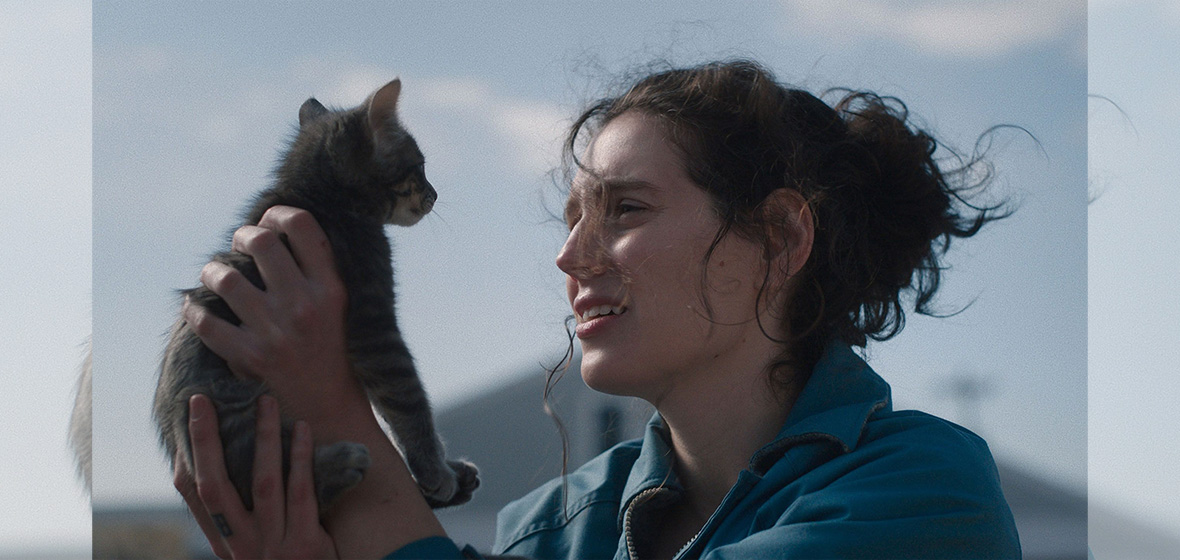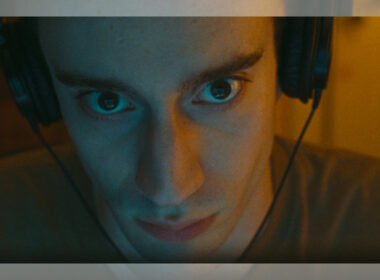Director: Eva Victor
Writer: Eva Victor
Cast: Eva Victor, Naomi Ackie, Lucas Hedges, Louis Cancelmi, Kelly McCormack, John Carroll Lynch
Eva Victor’s impressive debut, Sorry, Baby, pulled me down to the floor, curled in a foetal position, slowly but assuredly. I call it impressive, firstly, because it’s such an emotional slow-burner that evolves from its start as an indie dramedy into a full-fledged, profound drama about the perpetual effects of trauma. And secondly, because this is her first film, and there aren’t many filmmakers who could barge so confidently out of the gate.
Victor, who wrote and directed the picture, also plays the protagonist Agnes, a professor at her local liberal arts college in Massachusetts. She lives alone in a big house, surrounded by books, forest, and the odd visit from her neighbour Gavin (Lucas Hedge), probably the closest Agnes has to a romantic relationship. When her best friend Lydie (Naomi Ackie) visits, they reminisce about their college years. Lydie moved to New York, lives with her partner, and is now pregnant.
This contrasts Agnes, who lives in the house she grew up in, next to the university she studied at, and where she now works as a professor. Lydie’s visit also unearths a traumatic memory – Agnes was assaulted by a professor (Louis Cancelmi). Not many knew about the crime, so Agnes’ colleagues believed she was the teacher’s favourite, particularly Natasha (Kelly McCormack), another local girl from the same class who is also a professor in the same school and sees herself as a rival living in the shadow of Agnes.
Victor doesn’t make the assault the driving force behind the plot, but rather the elephant in the room on ever scene after the audience finds out about it (quick mention that the assault scene is expertly done with just a couple of shots from outside of the house, a jump cut to night, and then Agnes living the house in the dark in catatonic silence. No violence, no drama, pure compelling visual storytelling that resonates more than showing the action. Sorry, Baby is a film about a woman trying to move on from the trauma and struggling to find a solution to her problem. It’s not about revenge (“I want him to stop being someone who does that, and if he goes to jail, he’ll be someone who does that who is now in jail”), but about the crushing understanding that this is something Agnes will forever have to live with, even if that means sometimes having a cathartic cry. “It’s just like that, sometimes”, she says at the end. Trauma isn’t a beast that can be defeated, Jennifer Kent told us as much in her Babadook; it’s an inevitability we must learn to accept.
Victor structures the narrative into chapters from different years, connected to her reaction or growth. In one, she is given a permanent position in her college and offered the professor’s old office. She covers her bedroom window with her dissertation paper filled with his notes, attempting to take control of her distress. Another time, she uses her experience to avoid jury duty so earnestly that even the solicitor interviewing nods in understanding (“in my opinion, the law makes no sense”).
In a way, Victor reminds me of Hal Ashby via Elaine May, in how she approaches big themes with endearing quiet and humour. The setting is immensely personal, like Agnes living in the bed she made – there is no family, no past. This is a burden she needs to carry on her own, with the occasional booty call from her neighbour, who is hoping to get more from this relationship than Agnes is willing to give.
There’s also a meaningful connection with Michaela Coel, whose seminal I May Destroy You is essential viewing and also tackles the complexities of trauma after sexual assault. Coel is more euphoric and in-your-face in her approach; the London setting is busier and more oppressive than the quiet peacefulness of the American New England. However, the conclusion reached is strikingly similar, and both projects show refreshing tenderness for their protagonists.
Sorry, Baby does what all the great films do and addresses an important theme with the heaviness and levity it needs. It’s dark and funny, but also sentimental and warm. No tear is wasted, no laugh is left behind.
Verdict: 4.5 out of 5
For anyone who will forever be dealing with that shadowy monster in their back, and everyone who is open to understanding that “it’s just like that sometimes.”




